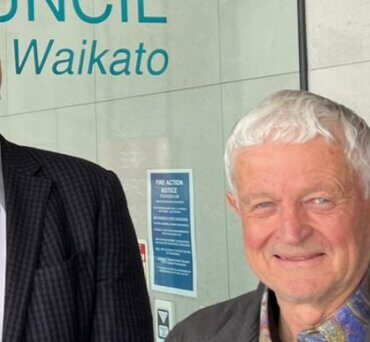
Garry Reymer, left, and Keith Holmes on the day they were sworn in as regional councillors.
Newly-elected Waikato regional councillors Keith Holmes and Garry Reymer have hit back at claims that they do not care about the environment.
Councillors have faced criticism for seeking an economic impact report on a plan change.

Keith Holmes
“No farmer wants to be an ‘eco-terrorist’, that is simply counterproductive to their personal enterprise sustainability,” Holmes, the immediate past president of Waikato Federated Farmers, said.
“Nor should any farmer be expected to work and farm at a loss or have their livelihoods taken off them by dumb laws without compensation. Please remember also the enormous amount of farmers’ personal income and time that has already gone into on farm environmental custodianship.”
Holmes pushed for the council to ask the Environment Court for time to commission the economic impact study before ruling on a water quality plan change. According to his calculations Plan Change One would cost the Waikato economy $5bn.

Garry Reymer
Holmes was responding to a letter published in The News in which Alice Hicks said she had read that there are four newly elected councillors who do not believe farmers should be fencing waterways, mapping contaminant loss or reviewing good management practices to protect and clean up waterways, and to protect our collective ground waters for future generations.
“Emotive, exaggerated messaging from Federated Farmers, once again pushes the ‘don’t make us responsible for any pollution’ messaging,” Hicks wrote.
Another letter from Gordon Walker was also critical at suggestions councillors were narrow minded.
Holmes said his role may have changed but the issues society faced remained the same.
“Kaitiaki and kaumatua or guardianship should always look to bigger picture and have a holistic view of what is best for us all,” Holmes said.
“The Plan Change One journey is still before the courts. The councillors are evolving to having a totally holistic overview to ensure that Waikato is prosperous, enabling, exciting and environmentally responsible. We also want to be able afford what our ratepayers demand – water treatment, roads, hospitals, houses, schools and ‘living affordability’. Simply put, our kaitiaki responsibility is to urgently generate the money in the Waikato region to pay for all these things.”

Garry Reymer on the farm

Keith Holmes on the farm
Reymer – a Waipā King Country ward councillor and former economics spokesman for Waikato Federated Farmers – said Hicks’ comments that the four new councillors did not think farmers should be responsible for the good stewardship of the land, could not be further from the truth.
“We all support best farm practice which make up the terms of supply to most of the producer companies they supply,” Reymer said.
“Things like fencing waters ways, nitrogen recording to set limits to restrict nitrogen loss through leaching or runoff are strictly monitored.”
Reymer described farmers as natural environmentalists because their livelihood depended on intergenerational wellbeing of the land and waterways.
“As councillors on the Waikato Regional Council we have a responsibility to ensure they continue to do so but to also balance the need for food security and the economic sustainability of the entire community,” he said.
“The worst polluted places of the world are where they get this balance wrong.
“We can be proud of how far we have come and our direction of travel.
“I have every confidence that this council will continue to strive for continued improvement on all key performance indicators around economic, people, water, and soil.”

Garry Reymer, left, and Keith Holmes on the day they were sworn in as regional councillors. Photo: Chris Gardner








